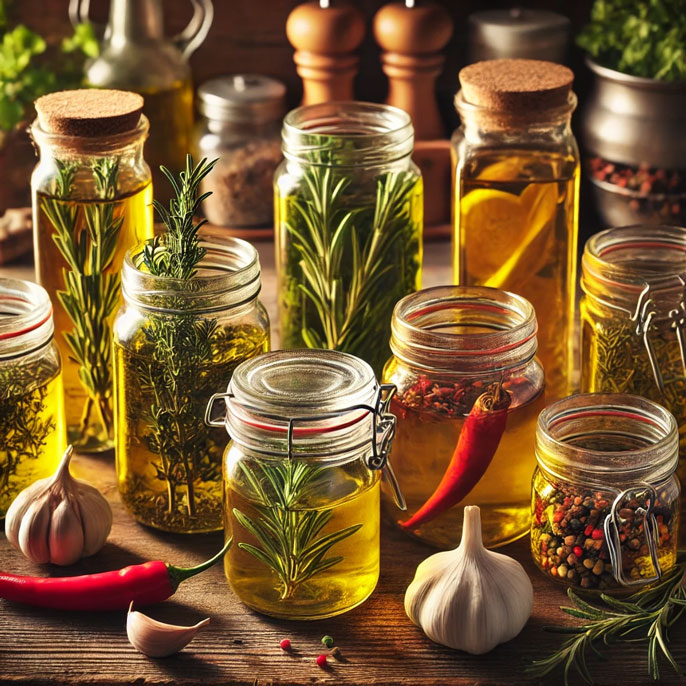Flavored olive oils are a delightful way to enhance your culinary creations. By infusing olive oil with various herbs, spices, or fruits, you can create unique flavors that add depth to your dishes. In this article, we’ll explore how flavored olive oils are made, their benefits, and how you can use them in your cooking.
How flavored olive oils are made
Flavored olive oils are typically created through two main methods: infusion and maceration.
Infusion
- Process: Infusion involves adding flavoring agents such as herbs, spices, or citrus peels to the olive oil and allowing it to steep over time.
- Duration: The process can take anywhere from a few hours to several weeks, depending on the intensity of flavor desired.
- Storage: Infused oils should be stored in a cool, dark place and used within a few months to maintain their flavor.

Maceration
- Process: Maceration involves crushing the flavoring agents with olives during the oil extraction process, resulting in a more robust flavor.
- Benefits: This method often results in a more stable flavored oil that retains its taste for a longer period.

| Method | Process | Duration | Benefits |
|---|---|---|---|
| Infusion | Adding flavoring agents to olive oil and allowing it to steep over time. | Few hours to several weeks | Easy to do at home, allows control over flavor intensity. |
| Maceration | Crushing flavoring agents with olives during the oil extraction process. | During oil extraction process | Results in a more robust and stable flavor. |
Benefits of flavored olive oils
Flavored olive oils not only enhance the taste of your dishes but also offer several health benefits. They retain the health properties of extra virgin olive oil, such as being rich in antioxidants and healthy fats. Here are some specific benefits:
- Antioxidant Properties: Like regular olive oil, flavored varieties are high in antioxidants, which can help reduce inflammation and lower the risk of chronic diseases.
- Enhanced Flavor without Extra Calories: They allow you to add flavor to your dishes without the need for additional ingredients that may add extra calories or unhealthy fats.
- Versatility: Flavored olive oils can be used in a variety of dishes, from salads and marinades to desserts and baking.
How to use flavored olive oils
Flavored olive oils are incredibly versatile and can be used in many ways:
- Salad Dressings: A drizzle of lemon or garlic-infused olive oil can elevate a simple salad to gourmet status.
- Marinades: Use rosemary or thyme-infused oil to marinate meats, enhancing their flavor and tenderness.
- Baking: Substitute regular olive oil with a flavored variety in baking to add a unique twist to your recipes.
- Finishing Oil: Drizzle basil or chili-infused oil over finished dishes like pasta or grilled vegetables for an extra burst of flavor.
| Use | Example | Description |
|---|---|---|
| Salad Dressings | Lemon-infused olive oil | Drizzle over a fresh salad for a burst of citrus flavor. |
| Marinades | Rosemary-infused olive oil | Use to marinate meats, enhancing their flavor and tenderness. |
| Baking | Vanilla-infused olive oil | Substitute in baking recipes for a unique twist. |
| Finishing Oil | Basil-infused olive oil | Drizzle over finished dishes like pasta or grilled vegetables. |
Storage and shelf life
Flavored olive oils need to be stored properly to maintain their quality and safety:
- Refrigeration: While it’s not necessary to refrigerate flavored olive oil, doing so can extend its shelf life. However, it may cause the oil to become cloudy and thicken.
- Shelf Life: Typically, flavored olive oils last about 3-6 months. Once opened, it’s best to use them within 1-2 months for optimal flavor.
- Containers: Store flavored olive oils in dark glass bottles to protect them from light, which can cause the oil to degrade. Avoid plastic containers, as they can affect the flavor and quality of the oil.
| Condition | Duration (Months) |
|---|---|
| Room Temperature | 3 |
| Refrigerated | 6 |
By understanding how flavored olive oils are made and used, you can enhance your culinary creations and enjoy the added health benefits. Whether you’re drizzling it over a salad or using it to marinate meats, flavored olive oil is a versatile ingredient that can elevate your dishes to new heights.
FAQ
| Question | Answer |
|---|---|
What is the difference between flavored and infused olive oil? |
Flavored olive oil is typically infused with flavoring agents, whereas infused olive oil may involve a process where the flavors are directly steeped into the oil. |
How long does flavored olive oil last? |
Flavored olive oil typically lasts about 3-6 months. Once opened, it is best to use it within 1-2 months for optimal flavor. |
Is infused olive oil safe? |
Yes, infused olive oil is safe if properly stored and used within the recommended timeframe. Be sure to follow safety guidelines to prevent the risk of botulism with homemade infusions. |
Does infused olive oil need to be refrigerated? |
While not necessary, refrigerating infused olive oil can extend its shelf life. It may become cloudy and thicken, but this does not affect the quality. |
Does olive oil lose its flavor when heated? |
Olive oil can lose some of its delicate flavors when heated, especially if overheated. It is best to use flavored olive oils as finishing oils or in low-heat applications. |
Can flavored olive oil go bad? |
Yes, flavored olive oil can go bad. Signs of spoilage include off smells, flavors, or a rancid odor. Proper storage can help prolong its shelf life. |
How to tell if olive oil is rancid? |
Rancid olive oil will have an off smell and a bitter or stale taste. It may also have a greasy feel. |
How to use flavored olive oil? |
Flavored olive oil can be used in salad dressings, marinades, baking, or as a finishing oil over dishes like pasta and grilled vegetables. |
How do you store flavored olive oil? |
Store flavored olive oil in dark glass bottles in a cool, dark place to protect it from light and heat. Refrigeration is optional but can extend shelf life. |
What is the best container to store olive oil in? |
Dark glass bottles are the best containers for storing olive oil as they protect the oil from light, which can cause it to degrade. |
How long can garlic sit in olive oil? |
Garlic should not sit in olive oil at room temperature for more than a few hours to prevent the risk of botulism. For longer storage, refrigerate the garlic-infused oil and use it within a week. |



